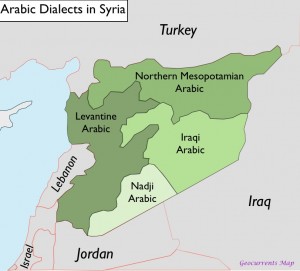Syria has too few loyal troops to control the entire country of 23 million people. At some point, they are going to need to
concentrate on holding the core regions of Syria to maintain the regime even if the price of maintaining the regime is territory.
Syrian forces
retook suburbs of Damascus from armed rebels over the weekend:
Troops seized eastern suburbs of Damascus from rebels late on Sunday, opposition activists said, after two days of fighting only a few kilometers from the centre of power of President Bashar al-Assad.
"The Free Syrian Army has made a tactical withdrawal. Regime forces have re-occupied the suburbs and started making house-to-house arrests," an activist named Kamal said by phone from the eastern al-Ghouta area on the edge of the capital.
The Syrian government recaptured the areas pretty quickly, so the FSA isn't terribly strong.
But the problem for Damascus isn't in capturing areas. They've been playing whack-a-mole for many months now. The problem is they have to move on to new areas to whack the rebels and scatter demonstrations against Assad. The regime security forces have to be getting tired (no rotations home for them). At some point, as I said, Assad is going to have to abandon the "clear, move on,
re-clear" strategy. That counted on the people getting tired of dying.
But with the memories of Mubarak and Khaddafi going, Arab League interest, and a growing trickle of defections from the Syrian armed forces, the people seem to be getting enough encouragement to keep going. "Clear and hold" is the way you separate insurgents from a population whose support is vital for insurgents to survive against their more heavily armed government opponents. And if the Syrians are to hold ground, they need to choose what ground they are going to hold.
We could yet see liberated zones away from the core areas of an arc from the southwest near the Israeli and Jordanian border, running through Damascus and then curving around Lebanon and running to the coastal region up to the Turkish border:
That would encompass the Alawite regions while holding the Alawites, Druze, and Christians who could be mobilized against the majority Sunni Arabs and Kurds, plus the key capital, trade routes through Lebanon (and support from Hezbollah), ports (for arms shipments), and access to Israel and Jordan in case a crisis with them is desired to rally support. I assume there are economic and strategic assets outside of that arc that Assad would need to control:
Perhaps the Syrians would need to control the river valleys indicated above for agriculture and for hydro-electric power (?). But that's a lot of troops that have to control that. Plus, Syria's oil resources are in the extreme northeast (although it isn't on that map). I don't know if that oil gets shipped out through Turkey or crosses Syria to the coast. If Assad tries to control the river valleys and oil transport corrdiors all the way back to the core western area, it makes a mockery of the idea of holding a
core area. But some assets outside of the core area would have to be held until the core area could organize and send out relief forces to expand government control as resources allow.
Interestingly, that core area might broadly correspond to the Levantanie Arabic dialect grouping (from the "geocurrents" site):
Outposts at other critical locations outside that zone could become the focus of conflict if the opposition can exploit abandoned zones and turn them into liberated zones. What will Syria's Kurds do out in the far northeast of Syria?
Syria would probably need to use air power to hit the abandoned zones to try to keep them from becoming liberated zones that are launching pads for attacks into the core zones. And Russia is willing to sell
cheap Yak-130 aircraft useful for such missions and is willing to veto UN Security Council resolutions that might seek to punish Syria for bombing civilians.
At that point, Syria would need to consolidate their power in their core zones and then expand ground power to begin expanding their controlled zones. Would Iran send forces to help? If not, Assad will have to call on a lot of sacrifice from his minority supporters to provide recruits to fight the majority Sunnis. Even the well off won't be able to avoid sending their sons into the security forces.
Unless the protesters lose the will to resist, it seems that the situation has to evolve into a civil war with each side holding its own territory. Assad doesn't have the horses to hold everywhere against anything but token resistance. If armed resistance continues to grow, Assad is going to have to write off peripheral areas, at least temporarily, to hold what he needs to maintain his regime in power.
UPDATE: Oh, Syria isn't going to get Yak-130s any time soon. My point is just that Russia is willing to sell them and that they'd be useful. For Assad, he'll have to win this uprising without them. But surely he's thinking about the next one.
UPDATE:
Russia is willing to sell to the Assad regime:
Russia's Deputy Defense Minister Anatoly Antonov said his country is not violating any international obligations by selling weapons to Damascus.
"As of today there are no restrictions on our delivery of weapons," he told journalists in Russia, according to the country's state news agencies. "We must fulfill our obligations and this is what we are doing."
I'll admit that I'm a bit jealous of the reputation Russia must have for sticking with an ally. Well, there's the Khaddafi exception--but in Moscow's defense, we did twist the UN authorization for protecting people into regime change. That's not a mistake Russia will make a second time.





